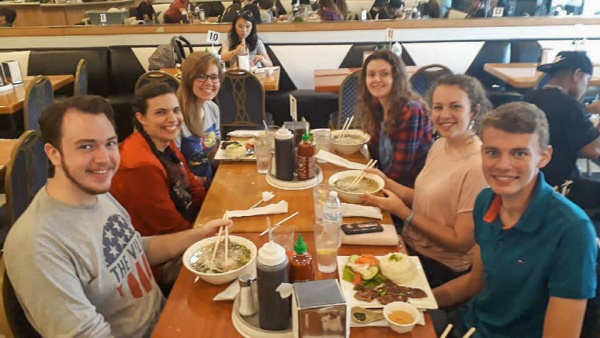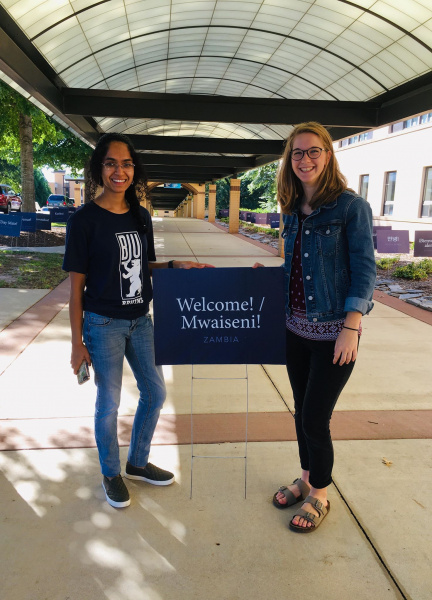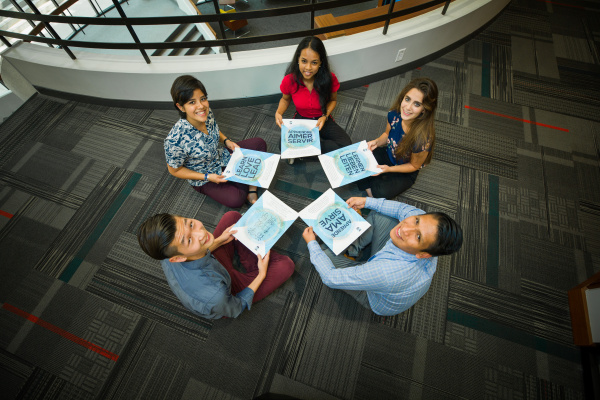BJU’s multicultural student body consists of more than international students. Third culture kids, such as the children of missionaries serving around the world, bring a different perspective to the campus. Even though the majority are American citizens, many of the missionary kids at the University find the U.S. foreign and consider home to be elsewhere.
Transitioning back to a culture they supposedly already know or getting to know a completely new culture can be hard. Understanding these three concepts has helped several third culture kids adapt to BJU.
You’re Not Alone
Orientation
At New International Student Orientation the week before general check-in, new students will meet dozens of others like themselves. Though most orientation members will not be missionary kids, the week-long activity is open to all third culture kids.
During this week the faculty, staff and student leaders establish connections and offer support to new students. Different speakers summarize life on campus through sessions about student life and cultural distinctions. Dr. Pearson Johnson, student care director and former missions pastor, mediates the MK Forum, a session offered only to third culture kids. Johnson says the Forum “is a chance for the incoming freshman or transfer students who are MKs to see and to meet some of the upperclassmen who have adjusted well and to get encouragement and advice from them.”
See Also: International Students: The JOY of Adapting to BJU Culture
Student Organizations
Even after orientation week, it’s not hard for new third culture kids to find others like themselves. With representatives from six continents, the cross-cultural student body is not small. It’s easy to find someone who, though they may not have grown up in the same country, understands the culture others come from and might even speak the language they’ve learned.
Harp performance major Olivia Holmes had only known Africa as her home for most of her life but hanging out with other multicultural people on campus helped her feel less homesick. “I found many internationals and made friends with them automatically, and that is a great help to MKs who are used to living in an international context,” says Holmes. “I love that BJU has organizations like the ISO (International Student Organization)! I know where to go to find people like me.”
See Also: International Students: Adapting to College Life
Joining Missions Advance, another student-led organization, can also be helpful. Missions Advance invites students to hear the experiences of visiting missionaries, to learn relevant missions information, and to pray for those serving around the world. Not only will new students meet other missionary kids and people interested in missionary work, but they will be able to pray together for their families’ ministries.
You’re Always Connected
Technology
 Missionary kids (from left to right) Isaac Stephens, Savannah McPhail, Lindsey Jones, Kaylah Smith, Abigail Freeze and Lucas Freeze (Photo by Savannah McPhail)
Missionary kids (from left to right) Isaac Stephens, Savannah McPhail, Lindsey Jones, Kaylah Smith, Abigail Freeze and Lucas Freeze (Photo by Savannah McPhail)Having a support system on campus is great, but it doesn’t stop third culture kids from missing their families. Thankfully, technological advances make communication overseas more accessible and efficient every day. While students like Savannah McPhail—a communication major who calls Cambodia home—may spend a year or more without physically seeing their family, scheduling weekly phone calls or video chats helps bridge the distance.
Holmes, who is in a similar situation, said that scheduling calls “enabled me to focus on my busy life here at school and do well knowing that I had time set aside to talk to my mom and dad and that they weren’t worrying about me because they got regular updates.”
Visits
But nothing compares to physical visits. Johnson encourages families “to be proactive about planning their times back here (in the U.S.).” If possible, families can schedule visits or accommodate their furloughs to match major holidays or school breaks.
Another option is to speak with the family’s home or sending church. “I think that’s a key thing the local church can be involved in—they can provide the funds for the student to fly back home,” said Johnson.
You’re More than Your Culture
After spending many years of their life in a different environment, a third culture kid may identify more with their foreign home than with the U.S. Coming back to the States can cause confusion. People around them assume they are American—but the third culture kid may not enjoy or function well in the culture.
Though no cross-cultural experience is the same, Johnson believes the most common difficulty these students face is “deciding on their part what their identity is going to be when they come as a student.” Will they stick to a single culture? Or will they be purposefully bicultural?
 Charrisse Fernandes and Ashlyn Hunt from Zambia (Photo by Ashlyn Hunt)
Charrisse Fernandes and Ashlyn Hunt from Zambia (Photo by Ashlyn Hunt)It took Ashlyn Hunt, a communication major who grew up in Zambia, a whole school year to understand her identity struggle. As a “hidden immigrant”—someone who looks like those around them but has a culturally different thought process—her period of culture shock was difficult yet rewarding. Hunt fought adjusting to the United States and “felt like I was having to change who I was to adapt to the American culture.” Talking with her dad made her realize that her cross-cultural understanding forms part of the skillset the Lord gave her and adapting to a culture different from her own doesn’t change who she is. After studying 1 Corinthians 9:19–23, Hunt understood the biblical importance of adaptation. “I finally realized that it is biblical to adapt because people are ministry. So, for the sake of the Gospel, I must adapt to the culture context I’m in.”
The greatest thing a student can learn from coming to the U.S. and BJU is that their identity doesn’t lie in their culture. During his undergrad years, one South Korean grad student whose family serves in Laos battled with identifying himself with a single culture, with calling a single place home. But he understood that “even though I might not belong to a specific country, I belong to the body of Christ.” For him, his identity in Christ became more important than his cultural identity.
See Also: Home
Understanding they’re not alone and their identity isn’t defined by their culture is crucial for third culture kids to enjoy their time away from home. At BJU, students will become a part of a community with more in common than just studies and homesickness. Above all, they share an identity in Christ.








